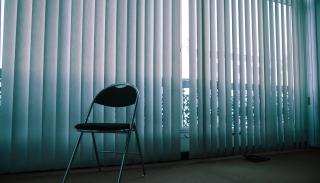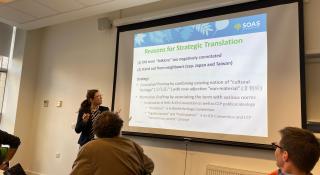
Breadcrumbs navigation
Why sticking plasters are not enough
In the second of a special series of articles on the theme of 'Gender, race, and the intersections of precarity', Dr Orly Siow lays out the problems with a so-called 'multi-function space'. Continuing the work flowing from our 2021 BISA and PSA report 'Career trajectories in UK departments of Politics and International Relations', Dr Skyler Hawkins (Newcastle University) coordinated this series to give real faces and experiences to the key statistical findings.
Let me introduce you to this ‘multi-functional space’.
It’s equipped with an old sofa, a few prayer mats, and a fridge for hastily labelled bottles of human milk.
Currently, I’m alone. The room is silent but for the rhythmic whir of the mechanical double breast pump. It’s attached to me, with my jumper is hoicked up over my shoulders. A bit like the anxiety dream where you get to work realising you’re only half dressed. Except this is real.
I try to hold the pump in place with one hand while I force down a supermarket sandwich and check emails on my phone with the other. I have twelve minutes before I’m due to teach a seminar on epistemology.
Soon there will be loud banging on the door. Colleagues, who urgently need to pray before their next teaching session. I try to press myself against the wall so I can’t be seen through the glass pane.
Like something out of Fawlty Towers, the ‘multi-function space’ is a room on campus designated to be shared between devout and lactating colleagues. It sounds like a joke, but it’s not. It’s part of the institution’s ‘EDI Policy’.
Both groups need the room multiple times a day, and at specific times.
It is not bookable, and the key is only available from a bemused security guard who may, or may not, be at his desk at any given moment.
Regaling a colleague with tales of this madness she kindly offers me the use of her office for expressing milk.
I’m grateful. I’ve just returned to work after birthing twins (hence the cumbersome double pump).
As a Postgraduate Teaching Assistant I have neither an office of my own, nor the energy to campaign for institutional commitment to separate lactation and prayer spaces on campus.
My colleague’s kind offer is a sticking plaster. An individual solution to an institutional problem.
It just about works- as long as she’s not using the office herself.
Or she’s not in that day to hand over the key.
Or I’ve asked so many times that week I’m just too embarrassed.
It’s easier to crouch in the toilet with a hand pump (no plugs in there to power an electrical one) and carry a scarf to cover up the inevitable leakages when standing up in front of students.
The story of the absurd ‘multi-function space’ and the not-quite solution offered by my colleague is not unique.
Well-meaning, sympathetic, eager to enact allyship, we often create sticking plasters to just about support each other when institutions fail us.
Often the urgency of the problem needs an immediate response.
The teaching assistants with office hours but no offices.
The carers who couldn’t—or wouldn’t—be furloughed during the pandemic.
We pitch in. We help out. We work around. Because often, we have to.
The problem with this is that, while I’ve moved on to a new institution and the kids have long since moved to solid food, the ‘multi-function space’ still remains. The teaching assistants still don’t have offices, and the Covid carers are still exhausted. Everyone’s exhausted.
But in order to make our institutions more ‘Equal, Diverse and Inclusive’, we have to summon the energy to deal with institutional problems at the institutional level.
Sticking plasters only hold for so long, and I can see many around me at breaking point.
Photo by Zoran Nayagam on Unsplash


